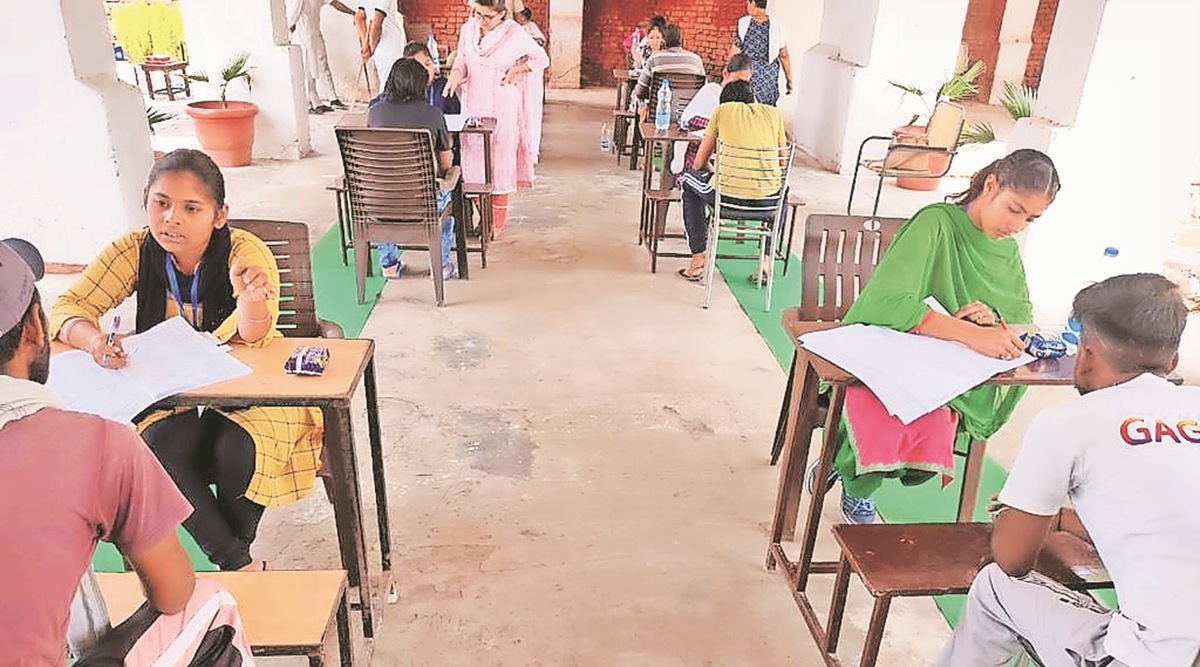 The survey will be conducted across 25 jails in Punjab. (Express Photo)
The survey will be conducted across 25 jails in Punjab. (Express Photo)For Gaurav Sohal, a third year law student from Panjab University Regional Center, Ludhiana, it was not an usual day. Not every day does a 23-year-old get the opportunity to visit a jail and interview inmates on their addictions and reasons behind it. Armed with 85 questions, a pen and an ID card, Sohal and 349 other students have just 10 days – one hour with each prisoner – to interview 14,100 inmates across 25 jails in Punjab to know about their stories, guaranteeing anonymity.
The survey, which started on Monday, revealed shocking details. While one inmate revealed that he has tried at least 14 types of drugs, another said that drugs and cigarettes are easily accessible inside jails but are expensive.
While some inmates started doing drugs as they wanted something for a kick to do hard labour for around 18 hours, others said their families were financially well off and they started taking drugs under peer pressure or to have fun. “The interviews were an eye opener. Inmates told us that they get drugs delivered from their friends during court hearings and distribute those among fellow inmates in exchange of money. A 21-year-old inmate told us that he started doing drugs when he was just 13 and never knew that it was harmful. Most inmates said that they were addicted to injections which are comparatively cheaper,” a student said, adding, “we generally assume that criminals are well built and intimidating, but in reality, drug addicts are physically weak and skinny. Their mental health is deteriorating, they are lonely and are very eager to talk to someone.”
The survey is being conducted under the supervision of special DGP prisons Harpreet Singh Sidhu and jail minister Harjot Singh Bains.
The questionnaire prepared by experts is part of the prison department’s “Punjab Jail Inmates Drug Use and Treatment Survey-2022” to be conducted across 25 jails in the state to know the causes of drug addiction among inmates and accessibility of drugs inside Punjab jails.
A drug-screening drive was conducted in June this year and it revealed that of 29,916 prisoners lodged in jails across the state, 14,100 (47%) were hooked to some kind of drug. Around 14 of 250 inmates at Women’s jail, Ludhiana, and 10 of 172 inmates at Women’s jail Bathinda are addicted to drugs, and are also part of the survey.
The 85 questions have been divided into six categories – geographical factors, psycho-social factors, socio-economic factors, police specific, prison specific and de-addiction, peer support specific questions. Educationists from Punjabi University, Patiala; Panjab University, Chandigarh; ISB Mohali and DAV College Sector-10, Chandigarh, were roped in as committee members to prepare the questionnaire in coordination with Dr Ranbir Singh, de-addiction expert and co-founder of OOAT programme in Punjab.
A senior official from the department said that as the next step towards treatment and rehabilitation of these 14,100 inmates who tested positive for drugs in the initial drive, they will now be surveyed to know their cause of addiction. “The survey will give us a new perspective of things and an insight on the lives of the inmates. For example, we are asking questions such as what pushed them into drugs, from where are they getting drugs. After the survey, a detailed report will be prepared for devising a de-addiction strategy in prisons.
Students have been given entry passes and ID cards to ensure hassle-free entry inside jails. The procedure is transparent and anonymous. The students fill the questionnaires manually while talking to the prisoners, and hand them over to data entry operators who upload responses on an app developed to analyse the collected data,” the officer said, adding that each questionnaire has an alpha numeric code, so responses are coded and anonymous.
Another student who interviewed an NRI addict says, “When we asked him to tick the drugs that he has taken, he told us that most of those were missing from our list of options. Some others said that some tablets were very easily available and didn’t even require a doctor’s prescription. Most of them had emotional breakdowns when we started talking about the past and how they got into this.”
Once the survey is completed, experts from ISB Mohali will submit a final report to prepare a policy for further treatment and rehabilitation of the inmates. Sidhu said that till now we have only a report by AIIMS to rely on. “This will be a first exhaustive data from our own jails. Health, education and other departments can use it too for policy making. We are trying to find out the major causes of addiction outside/inside prisons, accessibility of drugs both outside/inside prisons, de-addiction and re-lapse, among others,” he said.